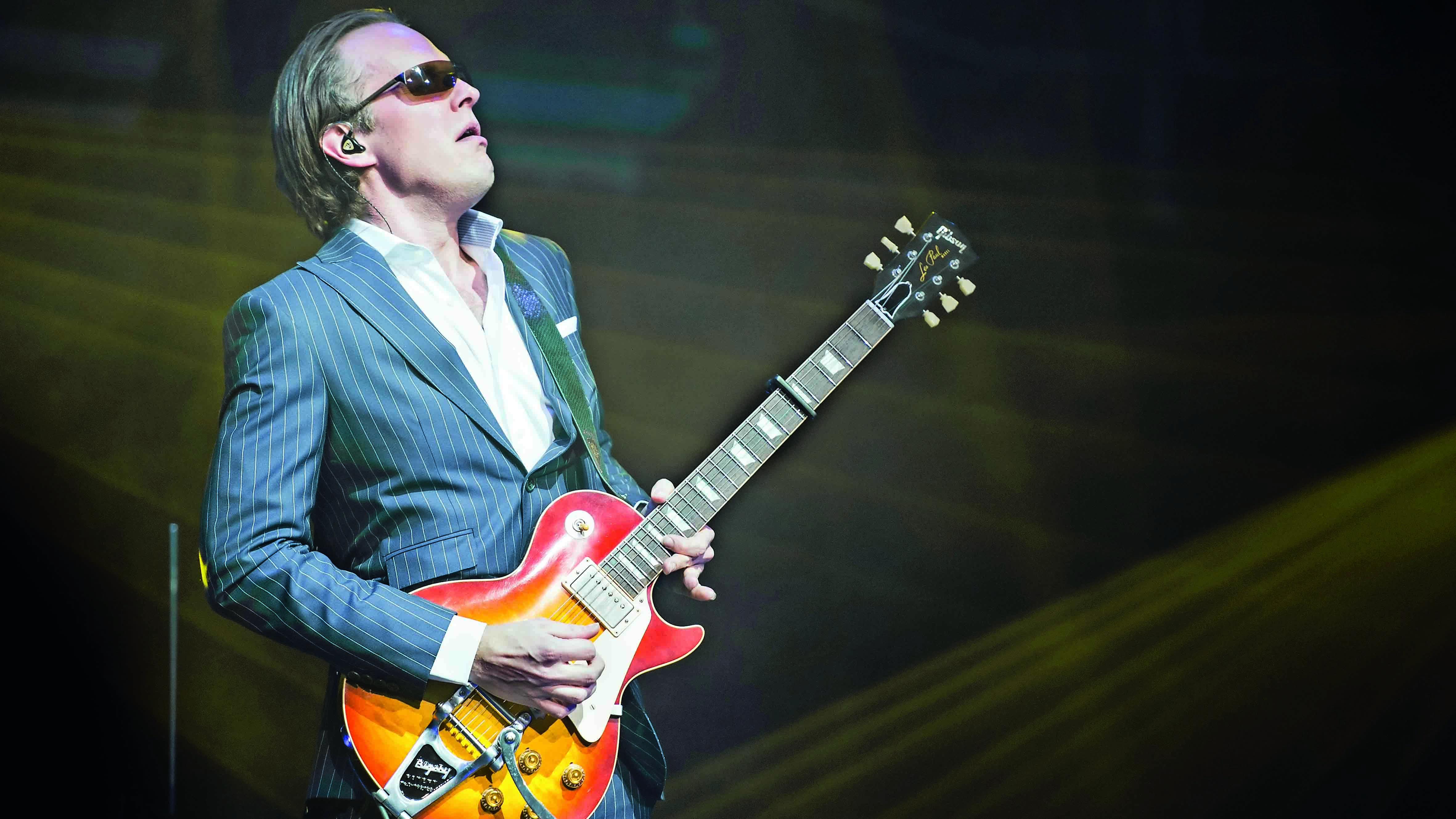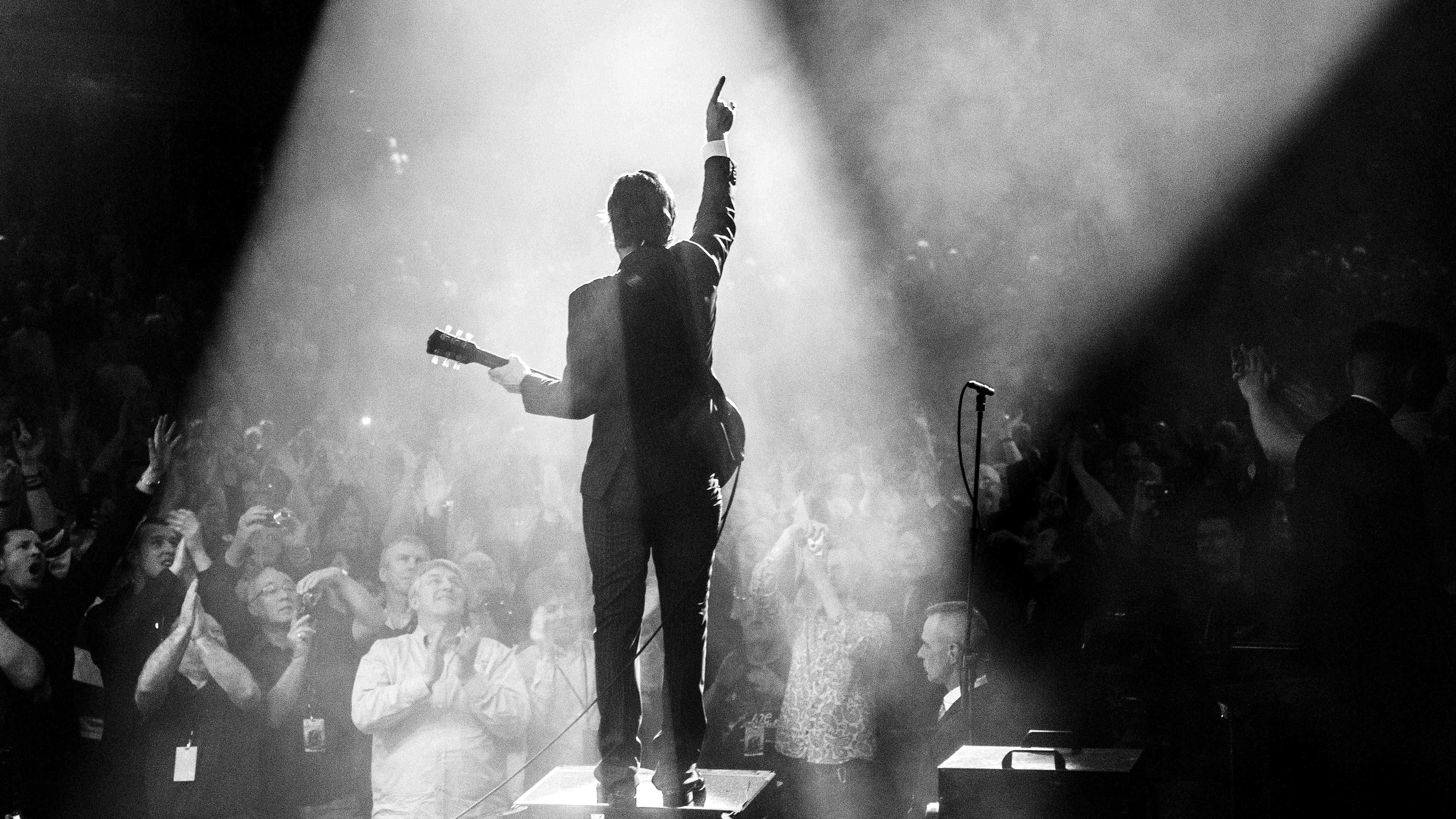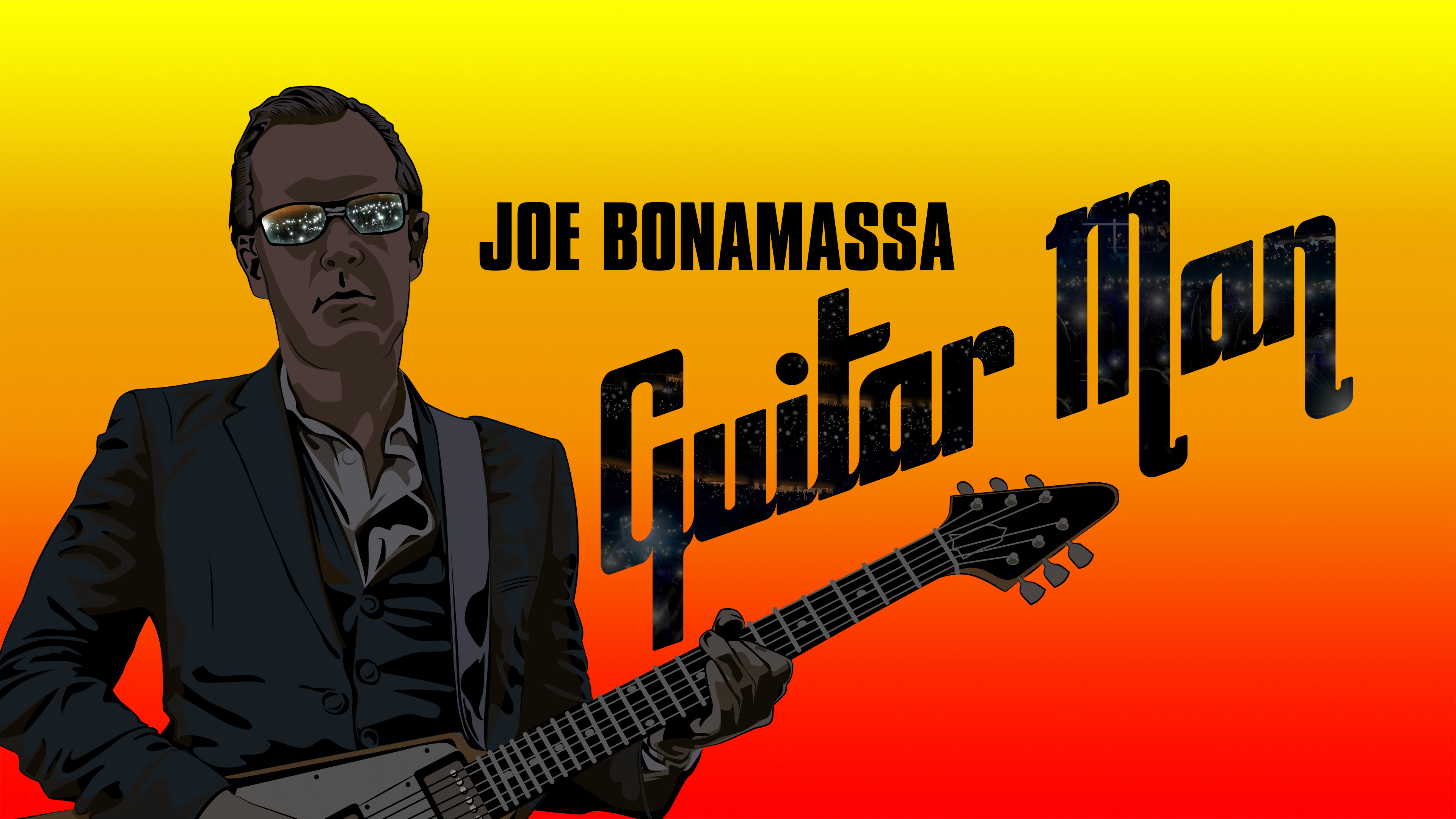Joe Bonamassa: “It’s a fight. My ’51 Nocaster brings out things in you as a player that, if it was too easy to play, I think it shaves a little of the intensity off”
MusicRadar’s Blues Guitarist of the Year reflects on the enduring power of the blues, what makes a great session and why the best guitars don’t play themselves

The craziness of being Guitar Man is not lost on Joe Bonamassa. He calls the Hollywood Hills home, so at least the idea of being the subject of a movie is not wholly alien. But still, it is funny where an obsession and gift with the electric guitar can take you.
Directed by Kevin Shirley and Philippe Klose, Guitar Man follows Bonamassa’s career from blues wunderkind, opening for B.B. King, to blues-rock unit-shifter and guitar collector extraordinaire, counting stops along the way as career milestones are passed, next levels are unlocked.
There’s some humour in the juxtaposition of Bonamassa’s current surroundings in Nerdville and the modest aspirations of young Joe who just wanted a genuine Fender amplifier. Guitar Man has a segment shot set against a whole wall of genuine Fender amplifiers, looking back through rooms that, from a remove, look as thought they are carpeted in Fender Tweed. Alas, that’s simply another section of his amp collection.
“I come from a very small town in upstate New York called Utica, New York,” he says. “We are having this conversation from the Hollywood Hills, in Los Angeles, California. If you told me 30 years ago that we would be having this conversation in the Hollywood Hills I would have said you are out of your mind. Out of your mind!”
"The movie applies to anybody who has ever felt like they have been outcast or not allowed to participate in something that they are passionate about"
In many respects, that’s the message to the movie. If Guitar Man is a lesson it’s that the blues has an audience that remains undiminished even as tastes in popular music change with the wind.
“There is an audience for everything,” says Bonamassa. “There are people who play a saw, with a bow, okay! And there are crowds that come and see somebody play a saw with a bow! If they can draw a crowd, I can find an audience. You know what I mean?
"If you can somehow manage to just jettison the chatter and focus in on your real goal… That was the whole point of the movie. The movie applies to anybody who has ever felt like they have been outcast or not allowed to participate in something that they are passionate about.”
Want all the hottest music and gear news, reviews, deals, features and more, direct to your inbox? Sign up here.
Here, Bonamassa talks about some of the aspects of his life and career that were brought into sharp focus by the Guitar Man documentary. The producers in his life, the importance of guitar stores, and how gear and places can influence a recording but ultimately it’s what you bring to the recording that matters.

“In my opinion, what you are offering to people is escapism"
There are easier ways of making a living than playing the blues.
“Absolutely. The deck is stacked. There are always the rogue agents that break through but to get a record deal, to get anybody at the record company behind you is just so difficult – then to get radio behind you.
The way I looked at it was, if you are not one of the haves you are kinda screwed, and we, my manager now of 30 years, decided that because we weren’t invited to the big kids’ table we weren’t just going to sit around and wait. We were going to go to another table.
What is it that pulls you and your audience towards the blues?
“I can go out to my studio and grab the Bob Dylan book of lyrics and I could sit there and play I-IV-V over all of Bob’s lyrics and tell a great story. That is one way. The other way of looking at it, which is more how I subscribe to it, is that you’ve got to have something to say, but you’ve got to present it in a way that, even if you are reading a lentil soup recipe, that it is entertaining to people
“In my opinion, what you are offering to people is escapism. That’s a fine line. You don’t want to preach to your audience. You don’t want to remind them of the bad news they left at the front door.”
“I just sat there going down memory lane, picking out guitar shops to promote, because that brick and mortar thing is to me the culture of society"
Absolutely. It helps the stories told in blues are all archetypes, that you are never talking about one thing explicitly. Covid-blues, for instance, would be too real.
“I got into so much trouble when this thing first started. I was on a friend of mine’s show, his name is Mike [Zito]. I said, ‘Mike, let me tell you this right now, I just want to get this off my chest, because when this thing is over I don’t want to hear Quarantine Blues on everything… I just don’t wanna hear it.’ And he said, ‘Is this a bad time to mention that my new single [laughs] is called Quarantine Blues?’
“‘Oh, ‘I’ll listen to yours, Mike. But only one!’ [Laughs] The thing is, you don’t want to be too literal. You want a bigger message. Sometimes the songs that you write that have a sad connotation have a happy connotation for somebody else. You really don’t know how your words will resonate with somebody else’s life. I’ve had songs where people have told me that they’ve played at their wedding, and I’m like, ‘Wow!"
“I understand how people sell a lot of pedals, guitars and amps based on the Instagram one or two-minute video. And that’s cool. But what they don’t realise is that they guy who is doing the demo is a really good player”
You spent some time on Instagram promoting independent guitar stores. Are you worried about their future?
“I just sat there going down memory lane, picking out guitar shops to promote, because that brick and mortar thing is to me the culture of society – no matter where you are. You could be in Omaha, Nebraska, or Edinburgh, and it’s the little shops that are run by mom and pop, that they have put their heart and soul into something they believe in. It all looks the same on Amazon Prime! It’s not a three-dimensional experience.
“Ultimately, what happens is you get, ‘Well, it’s easier to order on Amazon Prime.’ But you are killing Ted! Ted sells the same shit down the street, maybe for five dollars more, if you’ve got the five dollars, and you like your city, and you like how the place feels and the landscape and the culture of the city, support Ted! It is something that is worth supporting.”
True. Also, how many dollars can be wasted by not physically trying some gear. Demo videos are only helpful as a guide…
“This is the thing, and I understand how people sell a lot of pedals, guitars and amps based on the Instagram one or two-minute video. And that’s cool. But what they don’t realise is that they guy who is doing the demo is a really good player. He’d sound the same on anything!? ‘It doesn’t sound that way when I play it…’ Well, that’s something you need to address in your own playing to get it to that level where it does sound how you want it to sound.”
And the gear really is only part of the story…
“You are collecting a toolkit. Your house was built with tools – screwdrivers, nails, hammers and saws. It’s the same idea with guitars. You need a Gretsch, a Tele, you want a Strat, overdrive… Something that wobbles, a delay. These are all tools to have in your toolkit to basically accentuate your artistry in the best possible way.”
You have worked with some great producers. The film does a good job of placing these guys in the context of your career. But can you talk a little about what you learned from people like Tom Dowd?
“The thing about working with Tom was it was like a college education. I was just on the cusp of my twentieth birthday, and I was working with Sony, making some demos for them, and a guy named Michael Kaplan said, ‘Do you wanna work with Dowd?’ ‘You mean, Tom Dowd? Yeah, yeah I would! Michael, the bigger question is would he wanna work with me.’
“The next thing, I’m doing a gig at a BBQ joint in Syracuse called the Dinosaur Bar-B-Que, and there he is, Tom Dowd, sitting in the audience with my parents. He was just a gem of an individual, classy, brilliant, and never wore his credits on his sleeve, meaning that you could ask him about the Allman Brothers or Skynyrd, or Otis Redding, but he would never go, ‘Back when I did Otis…’"
What do you look for in a producer?
“I’ve been using the same producer for the last 15 years, Kevin [Shirley]. He’s brilliant. He has a big book of [musical] references, and a skill set, and he is always the best musician in the room. That’s the trick with being a producer; being the best musician in the room, seeing it in its entirety and not just in the macro. Some people throw takes away because they don’t like the way the toms sound. No, no, no, no! Who cares!? Does it go boom-boom? Done, let’s move on.”
You don’t want to overwork a good take?
“It’s just a different way of doing things. There are some producers who will absolutely do 50 or 100 takes of something because they are trying to push you into this out-of-body experience, and yeah, the few times I have been involved in those kind of things, I have had a very quick out-of-body experience – I put my guitar back in the case and then remove my body from the room! [Laughs]”

We’ve talked a bit about physical space of guitar stores, but what about venues, what about studios? How did that live-streamed show from the Ryman work for you?
“It was great. It was intense. Ultimately it left us feeling a little weird. To put that much fire and brimstone energy into a performance and then when you finish it is like a vacuum, it was like, ‘Wow!’ All we could hear were the footsteps of the techs bringing out guitars and stuff. Now, I have bombed in front of audiences before but that was ridiculous! [Laughs]|”
Now that is a blues story, getting booed by an empty room.
“I got booed by an empty room!”
“You want to play the venue and not have the venue play you. The first time in the Royal Albert Hall, it played me like a fiddle"
But that space, and the people who are in it, that’s especially crucial to the blues, where instinct and improv is the name of the game.
“One hundred per cent. The trick is: you go in there and you want to play the venue and not have the venue – or studio – play you. The first time in the Royal Albert Hall, it played me like a fiddle. ‘Oh my God! Look at this thing!’ I was petrified from the moment we started to the moment we ended, and about a week later? Still petrified. Okay, second time, it got easier, the eighth, ninth, okay, I got this.
“That’s why we did Abbey Road this year. Thank God! We skated under the barrier and got in in January. That would have been another disaster; we had already had to postpone that once before. I don’t think we would have gone back. I am glad we did it. I had been there three or four times, different scenarios, from Jon Lord’s symphonic records to Ginger Baker, but I never got the grand tour.
“So, I’m getting the grand tour, get shown the mic locker, and they’ve got the Lennon mics, the McCartney mics, and there’s the Hey Jude piano. Nice. We ran into Nick Mason, my friend from Pink Floyd. Wow, Studio 3! And there is the EMI console. Wow, impressive! Right? As a collector, impressive. And then after all that they said, ‘Well what do you think?’ I said, ‘Look at this console. This thing will do everything – except write the fucking songs!’"
A little much-needed context…
“You want to be inspired by the fact that you are honoured enough to be in there, that you can afford to be there, but never lose perspective. Just because you are in there means that you are going to get a magic take or a magic record. You have to detach yourself from being a fan.
"That is the thing about any of these iconic venues or studios, just because we went out to Muscle Shoals doesn’t mean we are going to do Wilson Pickett records. The the better songs you bring in, the better the band you bring in, the more prepared you are, the better the result.”
When you first got your ’54 hard-tail Strat, your first proper vintage guitar…
“0707?”
Yes. Did it make you better as a player?
“No. I think I handcuffed it to my wrist. I was a nervous wreck. I was a kid, and I had this old Strat and I couldn’t believe it either, the spaghetti logo, a real guitar! Over the years I have got over that phobia. I am not that hard on instruments when I play. I don’t scratch them up. I don’t wear the gigantic belt buckle and throw them around, so I am pretty aware of trying to preserve them as best you can. But I have had to live with that.
“There are instruments that you pick up that you least expect will make you a better player, the ones that are hard to play, the ones that have songs in ‘em but fight you. A perfect example: I hand my ’51 Nocaster to people and they’re like, ‘Man, this thing is hard!’ The screws on the bridge hurt my hand.’ But that’s the way I like it; it’s a fight. It brings out things in you as a player that, if it was too easy to play, then I think it shaves a little of the intensity off.”
Sometimes you’ve got to feel a little pain. It’s part of the fun.
“Yeah. My guitar tech says, ‘Why don’t you shim the neck on this one?’ And I’m like, ‘No, I like it.’”
Finally, we should inform you that you are – by popular vote – MusicRadar’s Blues Guitarist of the Year 2020
“Wow! I am honoured. I’m honoured – thank you.”
But hopefully, depending on the plague, 2021 we’ll have a better chance of seeing you perform?
“As long as enough people take the jab. Hopefully the vaccine works and everybody is safe and healthy, and that’s the priority. I see bands with dates booked, tentatively, in big venues for March, April. That’s going to be tight. Again, anybody who says they have all the answers and knows what is going to happen is lying to you, because it is all speculation.”

What about new music from you?
“By the time we tour again there will be two albums that we haven’t toured on. We are making a record in New York City in late March, and it is basically going to be a ‘subway record’ – a couple of guitars, a couple of amps. That’s just how I used to do it, take the subway down to the studio. Cash and carry. Old-school!
“The records in my world, y’know, you’ve got production cases and I have a collection of guitars, and you have got all of these options like that, and it is almost too much. You don’t need half of it, and you end up just playing, ‘Yeah, whatever!’ Now, two amps, in case one blows up. Not two amps at a time, just in case one blows up. Add a couple of guitars and you’re good.”
And it’s New York, a very distinct energy to the place…
“I also think that is going to influence the sound, like Abbey Road influenced the sound. I have always wanted to do a record in New York, and hopefully there is a New York by then!”
Joe Bonamassa’s Guitar Man documentary is out now on video-on-demand and digital release by Paramount Home Entertainment. More info at paramnt.us

Jonathan Horsley has been writing about guitars and guitar culture since 2005, playing them since 1990, and regularly contributes to MusicRadar, Total Guitar and Guitar World. He uses Jazz III nylon picks, 10s during the week, 9s at the weekend, and shamefully still struggles with rhythm figure one of Van Halen’s Panama.
